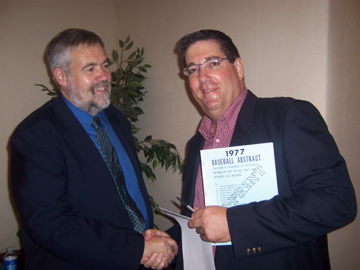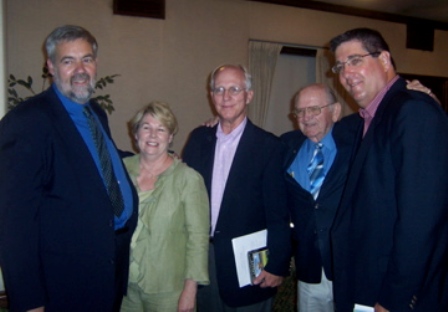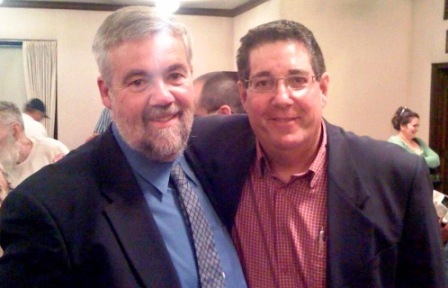
| Baseball Beat | July 24, 2007 |
The Baseball Reliquary held The Shrine of the Eternals 2007 Induction Day on Sunday in Pasadena. Yogi Berra, Jim Brosnan, and Bill James (shown shaking hands with me after the ceremony in the photo below) comprised this year's class of inductees. Although Berra (charity commitment on the east coast) and Brosnan (recovering from a fall) were unable to attend the event, James made the cross-country flight from Boston to Los Angeles on Saturday and spent two nights in Pasadena before returning home on Monday.
 Charlie Silvera, Berra's longtime backup catcher, drove down from San Francisco with his wife Rose to fill in one last time for his former teammate. Mr. & Mrs. Silvera joined Bill and me, as well as Terry Cannon, the Executive Director of the Baseball Reliquary, and two Reliquarians (Don Malcolm, who is known for producing the Big Bad Baseball Annual in the 1990s, and his friend Jay Walker) for dinner on Saturday evening. We met in the lobby of the hotel and walked a few blocks to Cameron's Seafood on Colorado Blvd. in Pasadena.
Charlie Silvera, Berra's longtime backup catcher, drove down from San Francisco with his wife Rose to fill in one last time for his former teammate. Mr. & Mrs. Silvera joined Bill and me, as well as Terry Cannon, the Executive Director of the Baseball Reliquary, and two Reliquarians (Don Malcolm, who is known for producing the Big Bad Baseball Annual in the 1990s, and his friend Jay Walker) for dinner on Saturday evening. We met in the lobby of the hotel and walked a few blocks to Cameron's Seafood on Colorado Blvd. in Pasadena.
The restaurant had a circular table for seven ready when we arrived. I sat between Bill and Terry and talked to both throughout dinner but Charlie kept us all entertained with stories about his playing days, teammates, opponents, managers, umpires, and sportswriters. Silvera, who will turn 83 in October, was as sharp as the knife that we used to cut the sourdough bread. A member of six World Championship teams during his playing days, Charlie wore one of his Yankees rings on one hand and a 1997 Florida Marlins (as a scout) on the other. Rose was wearing a World Series ring as well.
A humble and respectful man, Charlie feels fortunate to have signed and played with the Yankees, even if it meant caddying for Berra all those years. Silvera said he was paid well and never lost sight of the World Series paychecks that nearly doubled his total compensation. Charlie told us that he played with nine Hall of Famers and roomed with six of them, including Mickey Mantle during the Oklahoma Kid's rookie season. He claims Mantle was faster than Willie Mays and guessed that the switch-hitter bunted for as many as 10 to 15 hits per season during his heyday in response to a question posed by James.
Now a part-time advance scout for the Chicago Cubs, the San Francisco native and resident attends games at AT&T Park. Charlie said he doesn't pretend to tell the Cubs how to pitch to batters and instead focuses on managerial tendencies such as employing the hit and run, squeeze play, etc. James added that Boston has enjoyed success utilizing two advance scouts. As an example, the scout who tracked the Indians last weekend is now working with the players and coaching staff in the clubhouse prior to each game during its current series in Cleveland. In the meantime, the second scout is in Baltimore taking notes on Boston's next opponent — the Devil Rays — and will join the team in Tampa Bay when the Red Sox square off with their division rival this weekend.
While strolling back to the hotel, Bill and I talked about several subjects, including the club's losing record since the end of May (at least as of Saturday night), Curt Schilling's rehab start that day, Kason Gabbard's contributions, and a few minor leaguers such as Clay Buchholz ("great pickoff move"), Jed Lowrie ("athletic"), and Lars Anderson ("doing wonderfully for a 19-year-old"). After discussing logistics for Sunday, we parted company a few minutes before 9 p.m. (which, of course, was the equivalent of midnight for Bill).
I drove home to Long Beach and began putting the finishing touches on the speech that I would deliver to introduce James the following day. Sunday morning found me instant messaging with my colleague Patrick Sullivan while watching the final round of the British Open (we both found Paul Azinger's analysis "insufferable") and prepping for the speech that was fast approaching.
Arriving at the Pasadena Central Library shortly after 1 p.m., my wife Barbara and I met up with my brother Tom, our daughter Macy and her fiance Joel, and my good friend Brian Gunn, who most of you know as the brilliant writer of the now retired Redbird Nation. I also spent some time with Steve Henson, formerly of the Los Angeles Times and now the Senior Editor MLB for Yahoo! Sports, and Kevin Roderick of L.A. Observed.
Cannon led the audience in a ceremonial bell ringing in honor of Hilda Chester, the Brooklyn Dodgers fan who was renowned for ringing her twin cowbells in the hopes of starting a rally. The National Anthem and Take Me Out to the Ballgame were performed on the ukulele by multi-instrumentalist Don Kirby. After the presentation of a couple of annual awards, the keynote address was delivered by Tomas Benitez, an artist, baseball fan, and advisor to the Baseball Reliquary on Mexican-American Baseball in Los Angeles: From the Barrios to the Big Leagues.
 Berra was introduced by Silvera (next to me in the adjoining photo), who regaled the audience — a full house of approximately 200 in auditorium-style seating — with stories about the catcher annointed by James as the "best ever" as well as tales and jokes about Casey Stengel and others. Toni Mollett (second from the left) is Stengel's niece. She read a letter from Yogi ("I would have been there but I'm somewhere else") and accepted his plaque. John Schulian (middle), a TV writer-producer and former Chicago Sun-Times sports columnist and Sports Illustrated contributor, was there on behalf of Brosnan. His acceptance speech was featured in the L.A. Times on Sunday.
Berra was introduced by Silvera (next to me in the adjoining photo), who regaled the audience — a full house of approximately 200 in auditorium-style seating — with stories about the catcher annointed by James as the "best ever" as well as tales and jokes about Casey Stengel and others. Toni Mollett (second from the left) is Stengel's niece. She read a letter from Yogi ("I would have been there but I'm somewhere else") and accepted his plaque. John Schulian (middle), a TV writer-producer and former Chicago Sun-Times sports columnist and Sports Illustrated contributor, was there on behalf of Brosnan. His acceptance speech was featured in the L.A. Times on Sunday.
After Berra and Brosnan were inducted in The Shrine of the Eternals, I was called up to the stage to introduce James. I grabbed my notes and one of my props (the 1977 Baseball Abstract) from the shelf of the podium and delivered the following speech.
Three years ago, almost to the day, I began to review all twelve of Bill James' Baseball Abstracts. The project forced me to re-read every book from cover to cover and, in doing so, I came away with a greater appreciation for James than ever before — and, trust me, I have been a big fan dating back more than a quarter of a century.Although Bill has written dozens of books, the Baseball Abstracts are undoubtedly his best-known body of work and among the most significant collections in the game's history. James self-published the first five books. The early editions were typed on single-sided pages, photocopied, and stapled using a plain stock card cover.
The Baseball Abstracts grew in size and stature over the years. From a one-inch classified ad placed in the back of The Sporting News in 1977 to a publishing contract with Ballantine Books five years later to earning a regular spot on the New York Times bestsellers list every year, the Baseball Abstracts became an annual staple eagerly awaited each spring by the multitude of James' loyal readers.
An English major, James has a unique writing style that combines numbers and prose in a manner that make his essays clear, informative, and fun to read. To call Bill a statistician is a misnomer. Sure, he is known for debunking baseball's conventional wisdom through the use of statistical evidence but, as Bill pointed out in the 1981 Baseball Abstract, "good sabermetrics respects the validity of all types of evidence, including that which is beyond the scope of statistical validation."Take, for instance, The Defensive Spectrum, which Bill developed 30 years ago. It doesn't have anything to do with statistics, numbers, or computers. It’s totally qualitative. It’s a way to think about players, defensive positions, talent, and the aging process. Like so many of his innovations, The Defensive Spectrum is about organizing concepts so that we can understand and appreciate them.
The book "How Bill James Changed Our View of Baseball" is an apt title. His contribution to our understanding of the game of baseball is unparalleled. But more importantly, it's not just what he has taught us. It's what he has taught us to teach ourselves. Because of Bill, we have learned the importance of dealing with questions rather than answers.
Although James has company now, there was a time when Bill may have felt as if he was the lone voice in the wilderness. But there were a number of prominent early readers who were paying close attention, including current Boston Red Sox owner John Henry, who hired James as the club's Senior Baseball Operations Advisor in 2002. Bill is now in his fifth season with the Red Sox. It’s no secret that Boston won its first World Series in 86 years in 2004 — two years after Bill joined the front office.
Via email, I asked Theo Epstein, the GM of the Red Sox, how he would describe James. Theo wrote back, "2004 World Champion Bill James."
I asked Peter Gammons the same question. He told me two things: "The man who changed millions of minds . . . And I would not have my small corner in Cooperstown without him."
Rob Neyer, former assistant to James and current ESPN columnist, asked me to give his friend and the man he calls "The Babe Ruth of baseball analysis" his best.
And John Dewan, owner of Baseball Info Solutions, reduced it to one word: "Genius."
As for me, I would say that James has been the most influential person with respect to how we think about baseball since Branch Rickey. And, with that, ladies and gentlemen, it is my distinct honor to introduce one of Time magazine’s "100 Most Influential People in the World" and the Baseball Reliquary’s newest member of its Shrine of the Eternals, Bill James.
James spoke for approximately 15 minutes, covering the broad topic of change. Bill tried to deflect some of the credit that he has received over the years but admitted somewhat jokingly that he was more "arrogant" than "humble." James doesn't see himself as a "statistician," saying he doesn't produce any stats. "The players produce the stats," adding that baseball has been engaged in stats since the beginning. Speaking of which, James doesn't think 19th century baseball has much, if anything, to do with the modern game. He touched on steroids, racism, and other issues that have tainted the sport, suggesting that we should put the times in perspective, forgive and move on.
The man who hopefully one day will be enshrined in Cooperstown stuck around afterwards, speaking to attendees one-on-one, shaking hands, signing autographs, and conducting interviews with a few media outlets. He was generous with his time and the attention that he gave everyone.

It was a great weekend. In fact, thanks to Bill, it was one for the Eternals.
Comments
That was a great job, Rich. Thank you so much for sharing that with us. Great that a cowbell was rung for old Hilda. Even in California, Brooklyn's in the House!
Posted by: Alex Belth at July 24, 2007 8:02 AM
Congrats, Rich, and thanks for the great summary. I almost feel like I was there!
Posted by: studes at July 24, 2007 9:50 AM
That was a great report. Wish I was there. Bill James has done more to get people to seriously think about and research baseball than anyone by debunking old cliches and challenging myths.
Posted by: Al Doyle at July 24, 2007 10:11 AM
What a great piece, Rich. A distinct and much deserved honor for James, and a similarly distinct and appropriate honor for you to make the introduction.
And great comment, Alex. I wonder what Hilda would have thought of 3rd Bass or Biggie.
Posted by: Sully at July 24, 2007 10:18 AM
Sully,
Well, she probably would have liked Biggie just cause he was a Brooklyn boy. She also would have probably given him the business too!
Posted by: Alex Belth at July 24, 2007 11:31 AM
Wish I had been there, too. It looks like you had a terrific time.
Posted by: Rob McMillin at July 24, 2007 11:43 AM
Congratos, Rich!...If James and Blyleven go into the HOF the same year...you have a tough decision to make!
Posted by: Repoz at July 24, 2007 2:28 PM
Terrific write-up, Rich.
I was there. The common thread amidst a wide variety of speeches was the wonder that baseball can provide. James spoke for a little over fifteen minutes, without notes. Several times he seemed as if he was grasping at yet another new idea, that perhaps in the moment he was speaking, he was discovering something new and he was trying to find some way to relate it to the audience. Two things stood out:
a) That which we do not know far outweighs what we do know and this is a very good thing.
b) We are all doing what we were born to do. We are all changing the world.
It was fascinating to see a man who has provided so much knowledge, who has changed the way millions think not just about baseball but about life, describe himself as an arrogant man, one who is not humble. I was startled by the admission (if an admission he meant it to be), and I could not help but feel from the way he was speaking that his discoveries have not produced arrogance but humility.
I walked away in a sense of wonder. There is so much I have yet to learn about so many things and the knowledge is out there and I am comforted rather than disquieted by this fact. I've already used his words to comfort my son, telling him that he and I can change the world. Of course, I corrected myself. I told my son that we already have.
Thanks, Bill.
Posted by: Clay Landon at July 24, 2007 2:37 PM
Rich:
Thanks for the great write-up. I would have loved to hear the stories at dinner. Congrats on being asked to introduce Bill.
Big E
Posted by: Big E at July 24, 2007 4:09 PM
Thanks everyone. I greatly appreciate the well wishes and support.
Good recap, Clay.
Steve Henson of Yahoo! Sports has written an excellent article on the event. He was at the ceremony and did a fantastic job at capturing the offbeat nature of the organization.
Posted by: Rich Lederer at July 24, 2007 11:49 PM